
Executive Summary
“Digital flourishing” refers to feeling good about how we interact with others online and the choices we make in our digital lives. This concept is the counterpart to reports of ill effects related to digital technology use. It recognizes that many digital media consumers experience a variety of benefits that these technologies bring to their lives.
Research finds that when individuals are having positive experiences in their online activities, they also feel more satisfied with their lives, feel like they lead purposeful and meaningful lives, find their social relationships rewarding, and rate their overall lives as good. Digital flourishing encompasses five dimensions of user perceptions: how comfortable people feel presenting their true self online (authentic self-disclosure), how connected they feel to online communities (community connectedness), how well they feel they can self-regulate their time spent online (self-control), how capable they feel at engaging in civil discourse online (civil participation), and how motivated they are to pursue their goals when comparing themselves to others online (positive social comparison).
While the benefits of digital flourishing for psychological and social well-being have been documented by scholarly research, the extent to which the general American public is digitally flourishing remains unknown. Our team at the Human Flourishing Lab conducted a survey, asking a representative sample of just over 2,000 American adults about their current state of digital flourishing and their mental and social health.
KEY INSIGHTS
- Most American adults are digitally flourishing; more than three-fourths report flourishing on at least three dimensions of digital flourishing.
- More than eight out of ten Americans are digitally flourishing in authentic self-disclosure, self-control, and civil participation.
- Nearly seven out of ten Americans are digitally flourishing in community connectedness.
- Just under half (49%) of Americans are digitally flourishing in positive social comparison, making this the only dimension in which the majority of Americans are not flourishing.
- There are notable generational differences in specific dimensions of digital flourishing. Gen Z and Millennials are more likely to flourish in positive social comparisons and community connectedness, while Gen X and Boomers are the most likely to flourish in self-control and authentic self-disclosure.
- Hispanic, Black, and Asian Pacific Islander Americans are more likely to be digitally flourishing in positive social comparison and community connectedness than White Americans.
- For Americans overall, digital flourishing is positively associated with mental health and social health.
- Focusing specifically on Gen Z—the generation of Americans reporting the poorest mental and social health—digitally flourishing is positively associated with mental health and social health.
INTRODUCTION
With the rise of digital communication in today’s world, it’s important to understand how online interactions—like texting a friend or commenting on social media—impact our well-being. These interactions can be seen in both positive and negative ways. Much of the focus so far has been on the negative effects of digital interactions, especially how they can affect mental health. However, positive experiences, like feeling socially and emotionally supported, being inspired, benefiting from networking, speaking up on important issues, or building a movement or business, have received less attention in terms of their contribution to well-being. The concept of digital flourishing was created to highlight these positive features of digital life.
Digital flourishing is divided into the following five dimensions:
- Authentic Self-Disclosure: Feeling comfortable presenting one’s true self online
- Community Connectedness: Feeling connected to online communities
- Self-Control: Feeling able to self-regulate the amount of time one spends online
- Civil Participation: Feeling capable of engaging in online civil discourse
- Positive Social Comparison: Feeling motivated to pursue goals when comparing oneself to others online
Scholarly research establishes a link between digital flourishing and psychological flourishing. When people are digitally flourishing, they are better able to handle the challenges that come with digital technology, feel more satisfied with life, are optimistic about the future, and stay engaged in daily activities. They also contribute to the well-being of others and earn respect from those around them. Flourishing, digitally or in life in general, is based on the idea that people are motivated to act in this world to fulfill basic psychological needs. For example, humans have a fundamental need to belong and strive to meet this need by forming, maintaining, and restoring close relationships. Traditionally, these social goals have largely been pursued through in-person experiences, even though humans have long used technology to maintain social connections (e.g., corresponding by mail with a loved one who is geographically far away). In the modern world, digital technologies can be used to meet new people, stay in touch with existing connections, and re-establish contact with old connections. In other words, though much attention is paid to how digital technologies such as social media can potentially undermine well-being, they can also be utilized to enhance well-being by helping people meet a wide range of psychological needs that support overall flourishing.
Though digital flourishing is beneficial to individuals regardless of age, it may be especially important for young Americans (Gen Z) because they are more likely than older generations to report poor mental and social health. Young Americans also spend the most amount of time online.
Previous research demonstrates that digital flourishing is associated with a range of well-being indicators but does not reveal the current state of digital flourishing among American adults. Is digitally flourishing common or rare? Is it limited to specific demographics? And how does digital flourishing relate to overall mental and social health among the general population of U.S. adults, and Gen Z adults specifically?
To explore these questions, we surveyed a nationally representative sample of just over 2,000 American adults. Survey participants were asked to report how true or untrue several online interaction behaviors were for them. We also asked participants to report their agreement with statements regarding their mental health and social health.
ARE AMERICANS DIGITALLY FLOURISHING?
Most Americans are digitally flourishing. More than half (56%) of Americans are flourishing on at least four of the five dimensions of digital flourishing, and more than three-fourths (77%) are flourishing on at least three dimensions of digital flourishing (Figure 1). Moreover, nearly seven out of ten or more Americans are flourishing on each dimension, except for positive social comparison, in which only around half of Americans are flourishing (Figure 2).
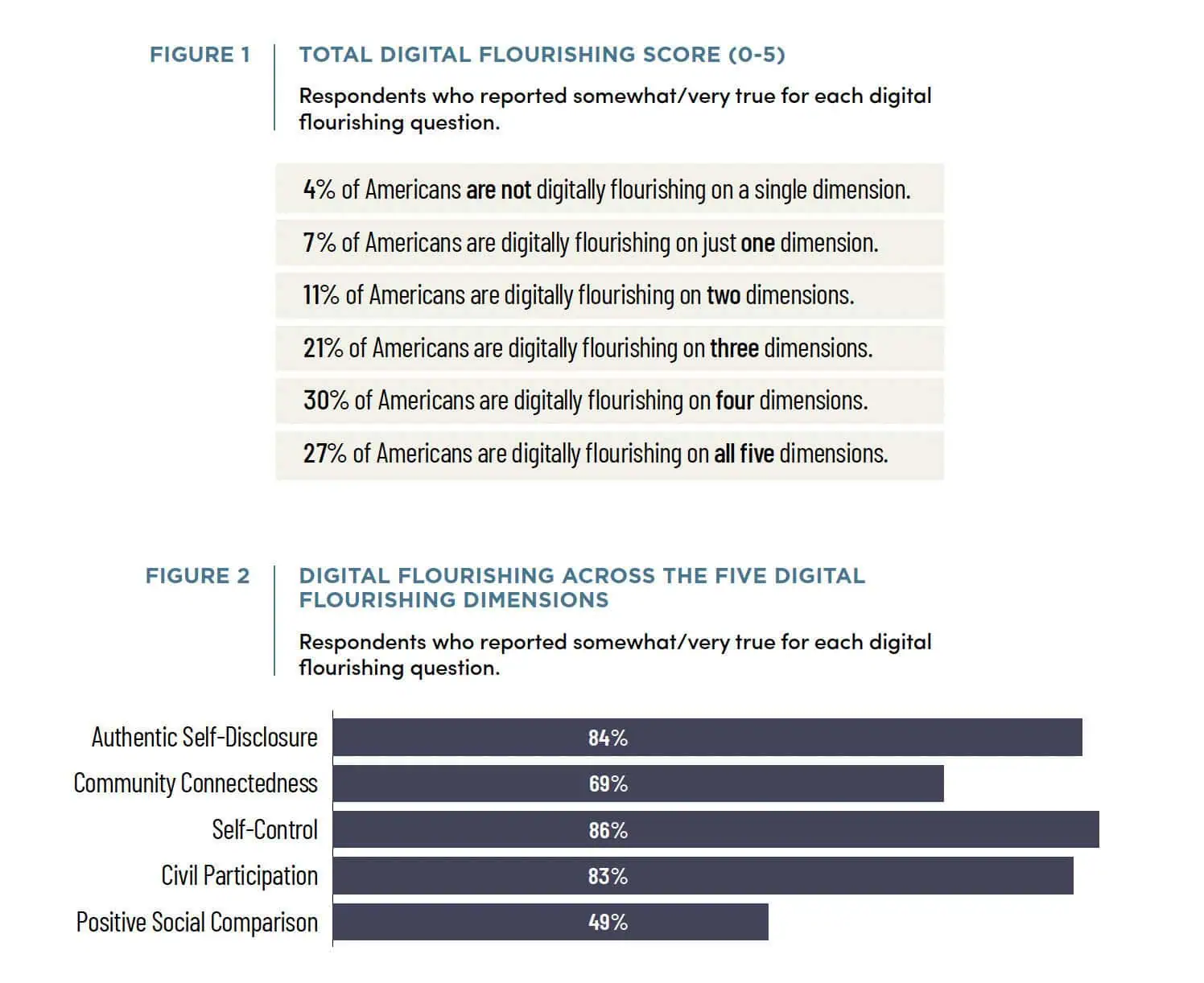
WHO DIGITALLY FLOURISHES IN POSITIVE SOCIAL COMPARISON?
Positive Social Comparison: Feeling motivated to pursue goals when comparing oneself to others online
Among the digital flourishing dimensions, positive social comparison is the area where the fewest Americans (49%) report thriving. However, a closer analysis reveals notable differences, specifically for gender, age, and race (Figure 3). Men (52%) are more likely to feel motivated by positive online social comparison than women (46%). Younger Americans are more likely to feel motivated than older generations, with 61% of Gen Z and 59% of Millennials indicating feeling inspired by online social comparison to pursue their goals, compared to 45% of Gen X and 33% of Boomers. In addition, Hispanic (59%) and Black Americans (59%) are more likely to feel motivated than White Americans (43%).
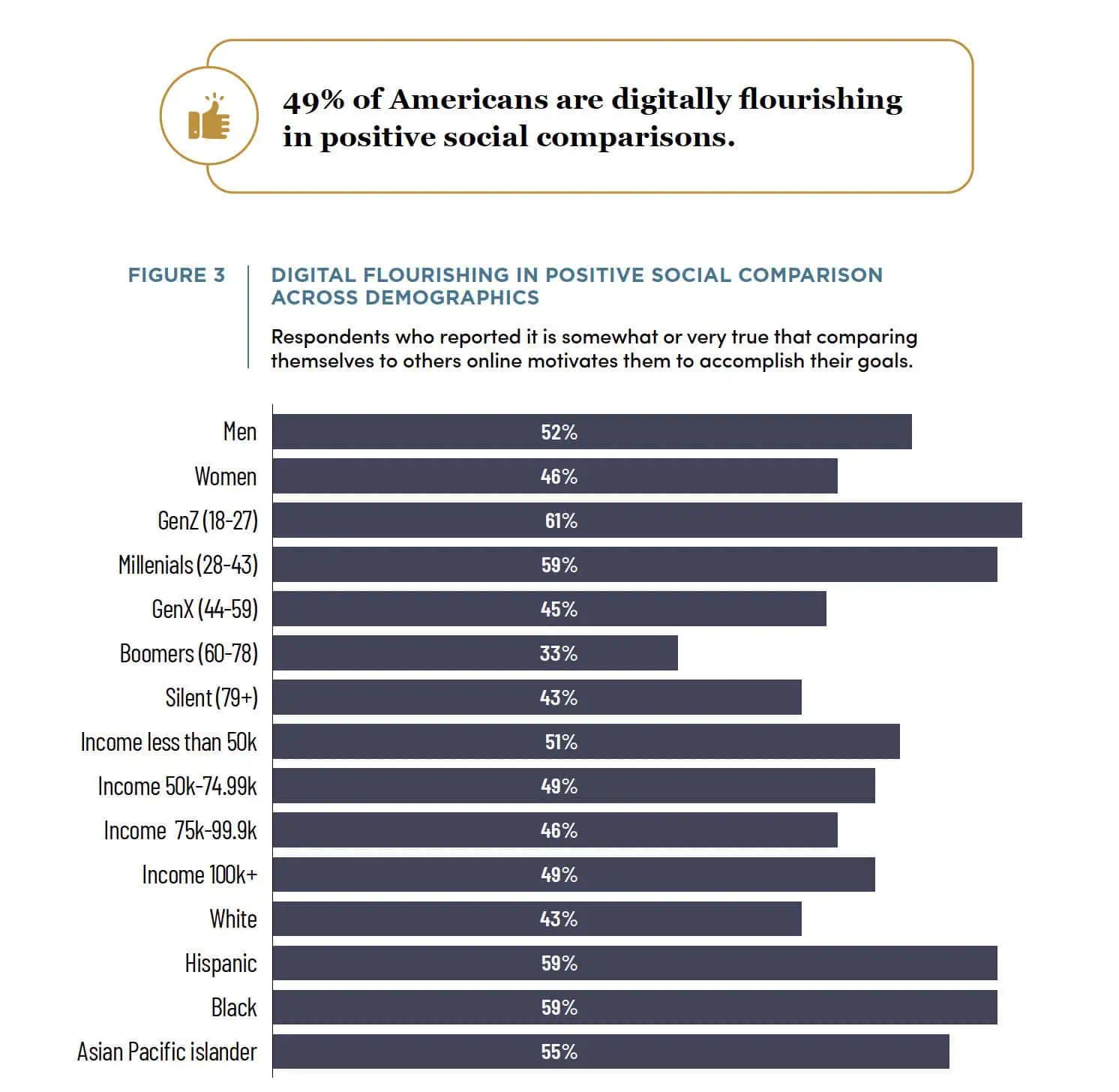
WHO DIGITALLY FLOURISHES IN CIVIL PARTICIPATION?
Civil Participation: Feeling capable of engaging in online civil discourse
Overall, eight out of ten Americans across all demographic groups feel that they know how to get their point across online without offending people. The data revealed only slight differences in perceived capability for civil online conversations based on gender, age, income, and race (Figure 4). Women (85%) are slightly more likely to report that they know how to have a civil conversation online compared to men (81%). Gen Z (78%) feels slightly less capable than older generations (83% or higher). There is a slight trend indicating that people with lower income (below $50k, 79%) feel less capable than those in higher income brackets ($50k-100k+, 83%-86%, respectively). Hispanic Americans (79%) feel slightly less capable compared to White (84%) and Black Americans (83%).

WHO DIGITALLY FLOURISHES IN SELF-CONTROL?
Self-Control: Feeling able to self-regulate the amount of time one spends online
Whereas most Americans (almost nine out of ten) feel like they are in control of the amount of time they spend in online communication (which includes texting, social media, email, etc.), the data highlights distinct patterns in perceived control over online communication across age, income, and racial groups (Figure 5). Boomers (92%) and Gen X (90%) are more likely to feel in control than Millennials (83%) and Gen Z (77%). Higher income levels are generally associated with a stronger sense of control. Additionally, White Americans (88%) are slightly more likely to feel in control than other racial groups.
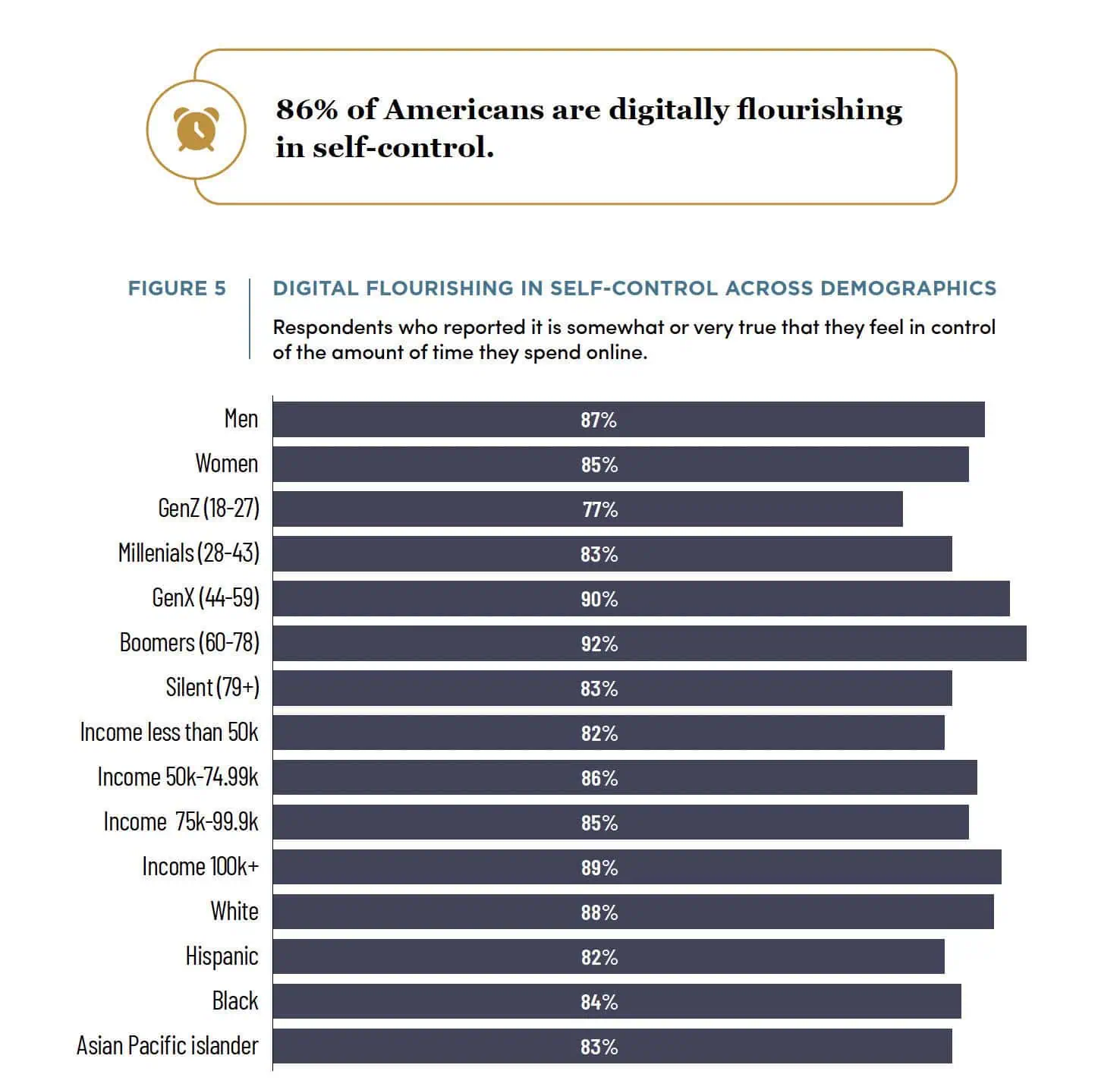
WHO DIGITALLY FLOURISHES IN COMMUNITY CONNECTEDNESS?
Community Connectedness: Feeling connected to online communitie
Seven out of ten Americans report they feel part of a community when they interact with others online. This is slightly less than for the civil participation and self-control dimensions, where more than eight out of ten Americans report flourishing. The data reveals notable patterns in Americans’ sense of online community connection across age, income, and racial groups (Figure 6). Gen Z feels significantly more connected to an online community (77%) than any other age group, with older Americans reporting lower levels of social connection. Income also plays a role, as Americans earning over $100k feel the least connected online (66%) compared to lower income groups. Racial differences are also evident, with Black Americans feeling the most connected to an online community (77%), followed by Hispanic (74%) and Asian/Pacific Islander (72%) Americans. White Americans report the lowest level of online community connection (65%).
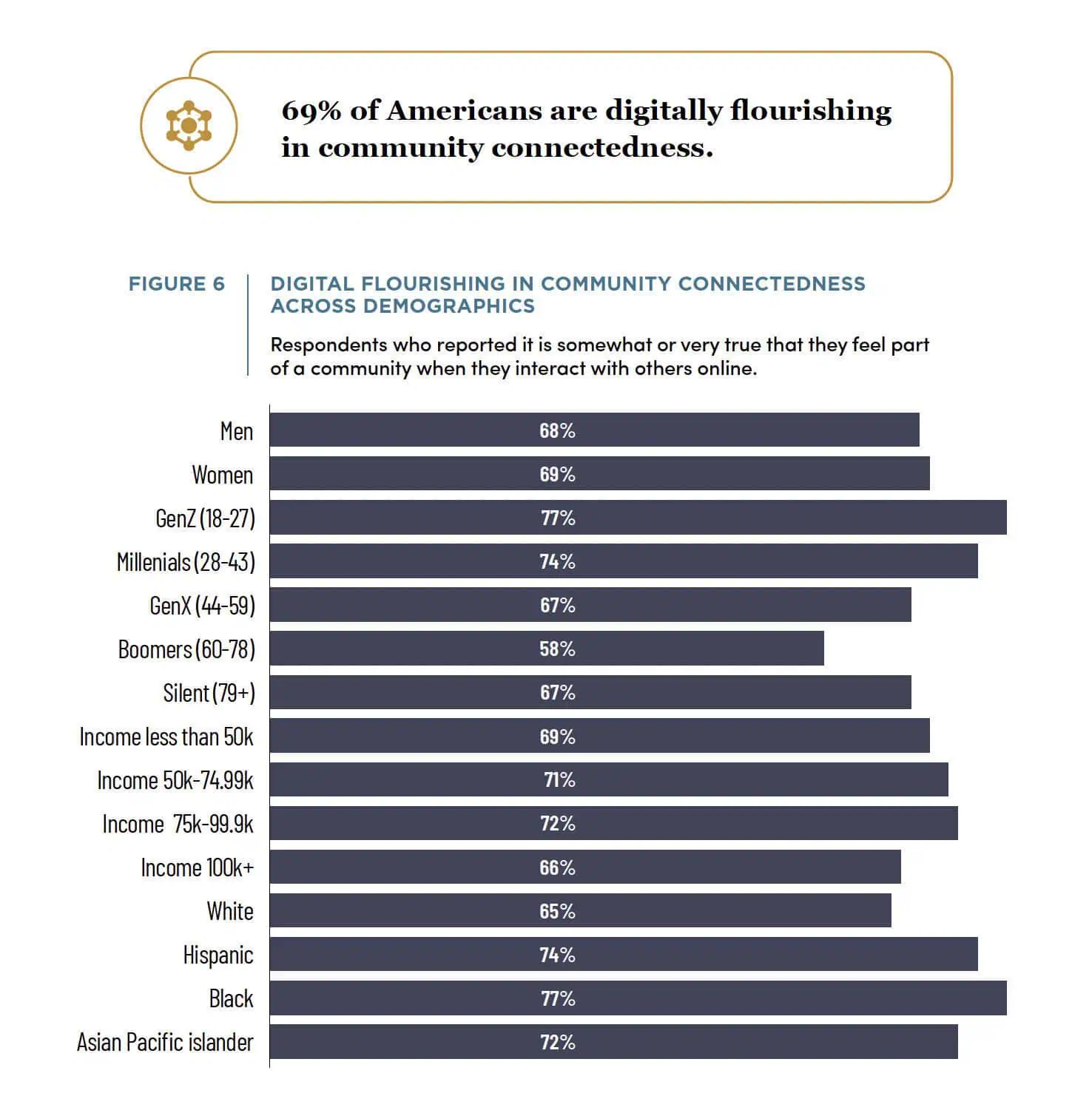
WHO DIGITALLY FLOURISHES IN AUTHENTIC SELF-DISCLOSURE?
Authentic Self-Disclosure: Feeling comfortable presenting one’s true self online
More than eight out of ten Americans indicate they feel comfortable presenting the person they are when interacting online. But some generational, income-based, and racial differences in Americans’ comfort with presenting their authentic selves online emerge from the data (Figure 7). Gen Z feels the least comfortable with this (78%), while older generations, such as Gen X (87%) and the Silent Generation (90%), feel the most comfortable. There is also a slight trend showing that comfort with authenticity online increases with income. Among racial groups, White Americans report the highest comfort (87%), while Black and Asian/Pacific Islander Americans feel the least comfortable (79%).
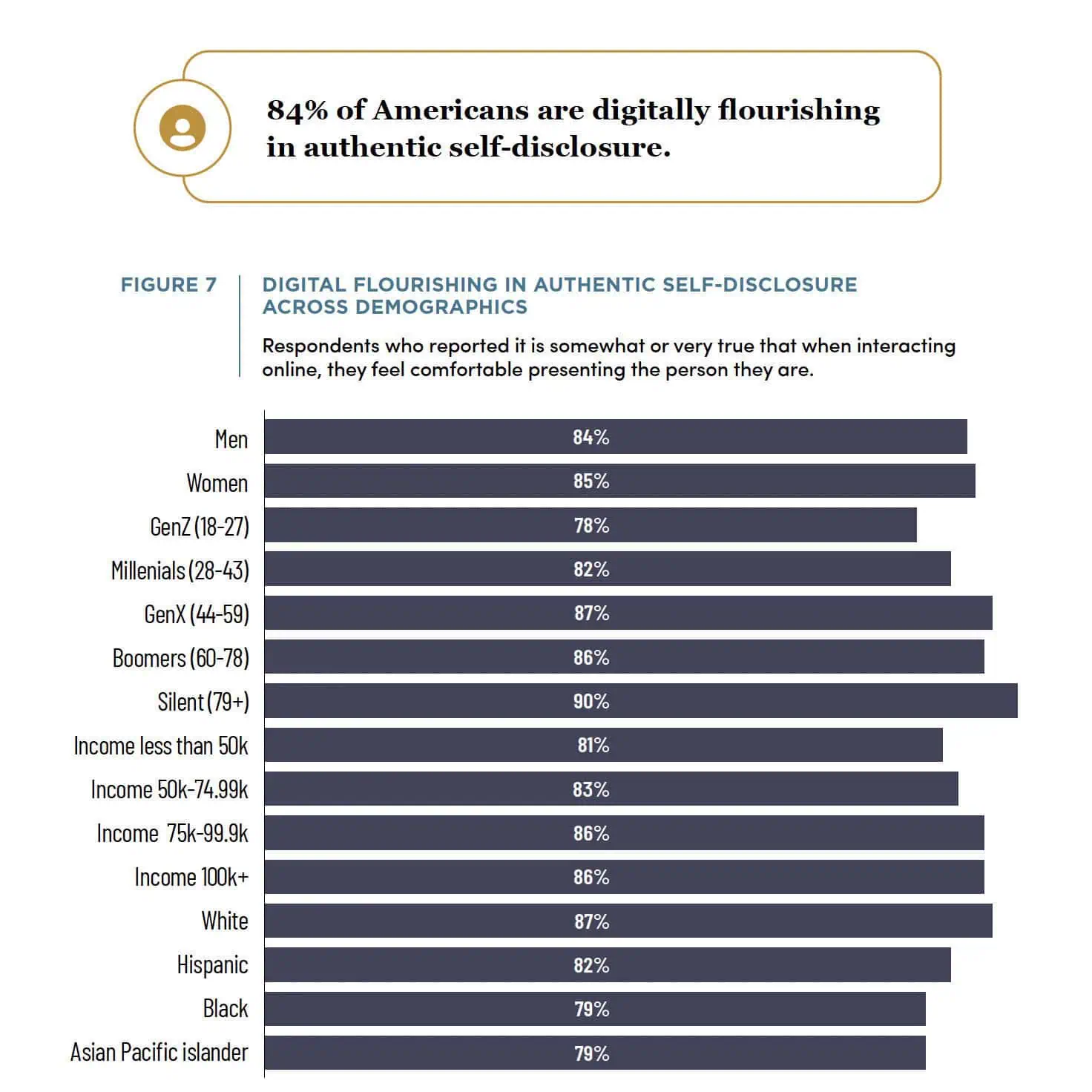
DIGITAL FLOURISHING AND MENTAL HEALTH
Digital technology is often portrayed as a detriment to mental health. However, digital flourishing involves experiences of self-directed and self-regulated positive online engagement that could benefit psychological well-being. Indeed, we observed that across all dimensions, Americans who are digitally flourishing are more likely to report good mental health than Americans who are not digitally flourishing (Figure 8). Some dimensions of digitally flourishing are more strongly related to mental health than others. For example, the largest difference in mental health is between Americans who are and are not flourishing in self-control, whereas the smallest difference is between those who are or are not flourishing in positive social comparison. However, overall, Americans experience better mental health when they are digitally flourishing
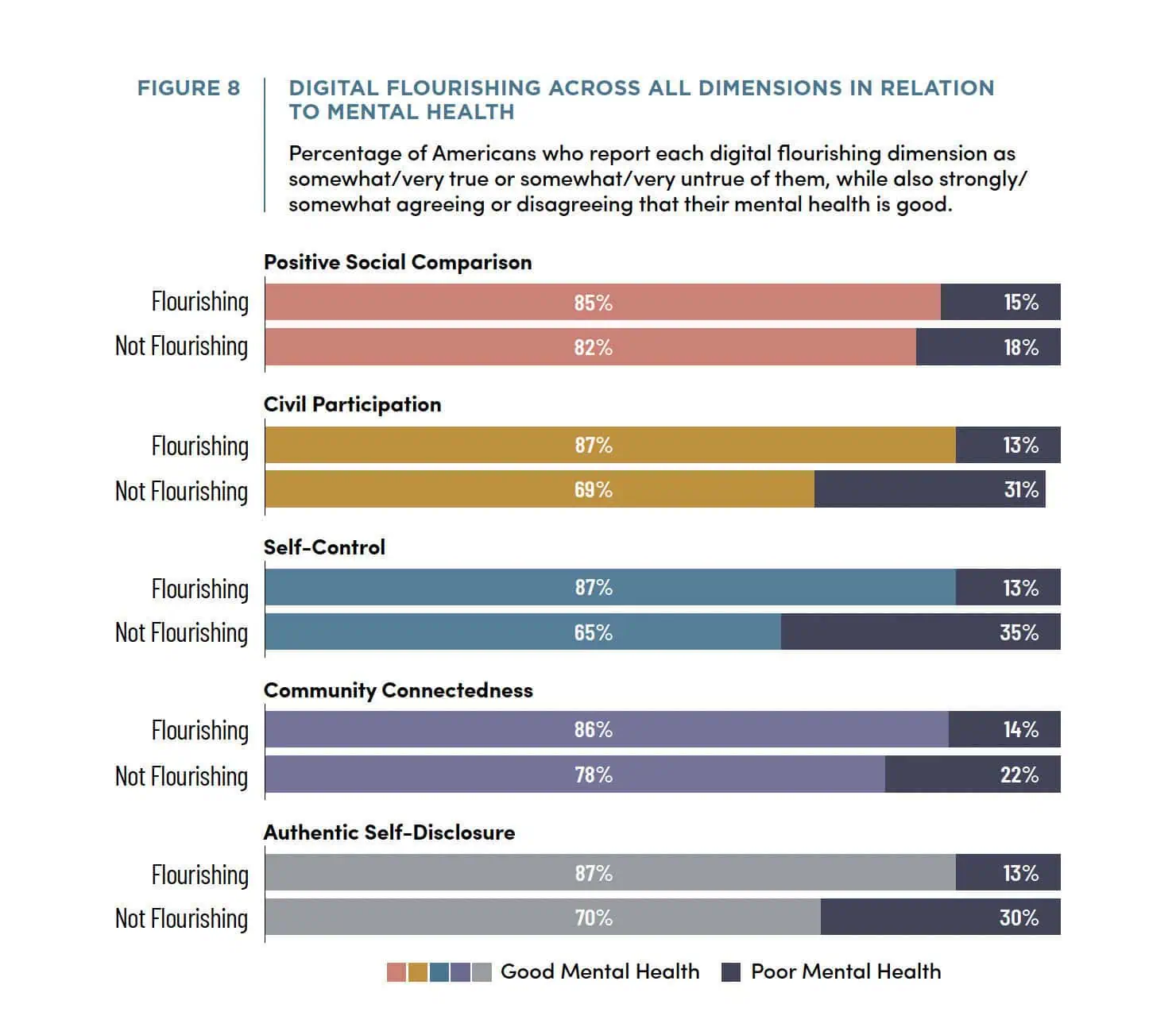
DIGITAL FLOURISHING AND MENTAL HEALTH AMONG GEN Z
Young Americans are more likely to indicate experiencing mental health problems such as depression and anxiety. Thus, not surprisingly, there is considerable public concern about social media’s negative impact on mental health among young Americans (Gen Z), but what about the positive side of digital flourishing? First, similar to other surveys, we find that Gen Z adults are less likely than older generations to report good mental health (Figure 9). However, as with the full survey sample, Gen Z adults are more likely to report good mental health if they are digitally flourishing, with self-control being the dimension with the largest difference (Figure 10). For example, whereas 25% of Gen Z who are flourishing on self-control report poor mental health, this number increases to 43% for those who are not flourishing on this dimension.
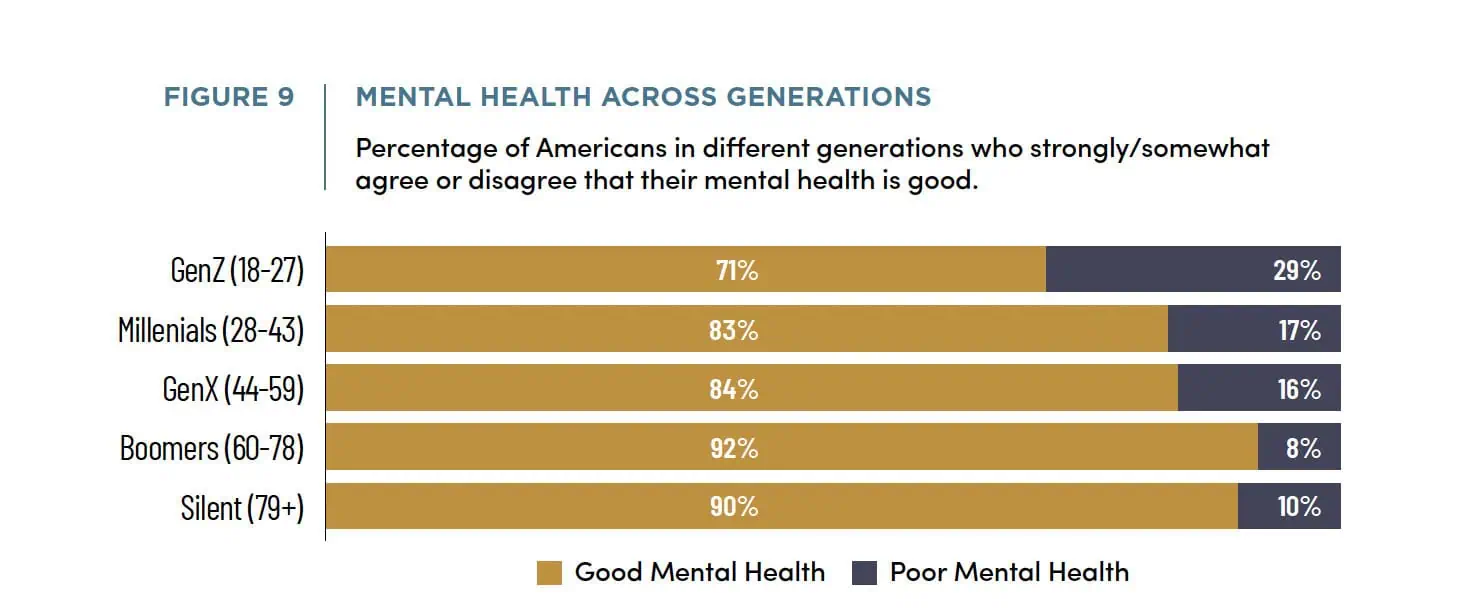
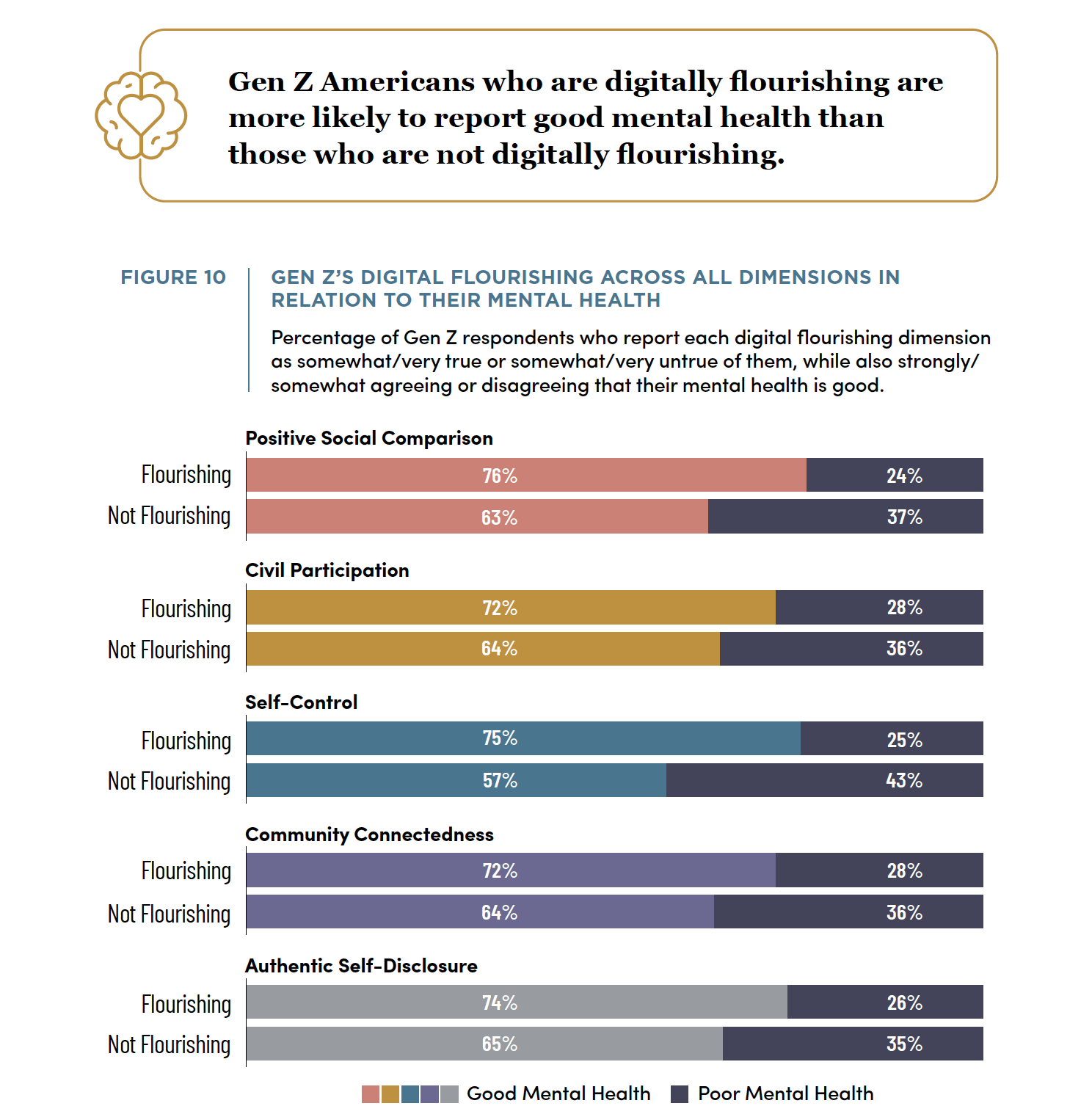
DIGITAL FLOURISHING AND SOCIAL HEALTH
Social health refers to Americans’ feelings of community connectedness. That is, Americans who are socially healthy are less likely to feel lonely. Digital technology is often portrayed as a barrier to fostering social relationships in the real world. However, since digital flourishing involves online social interaction, it might be associated with overall positive social health. Indeed, we observed that across dimensions, Americans who are digitally flourishing are more likely to report good social health than Americans who are not digitally flourishing (Figure 11). Some dimensions of digital flourishing are more strongly related to social health than others. For example, the largest difference in social health is between Americans who are and are not flourishing in the dimension of authentic self-disclosure, whereas the smallest difference is between those who are or are not flourishing in positive social comparison. However, overall, Americans experience better social health when they are digitally flourishing.
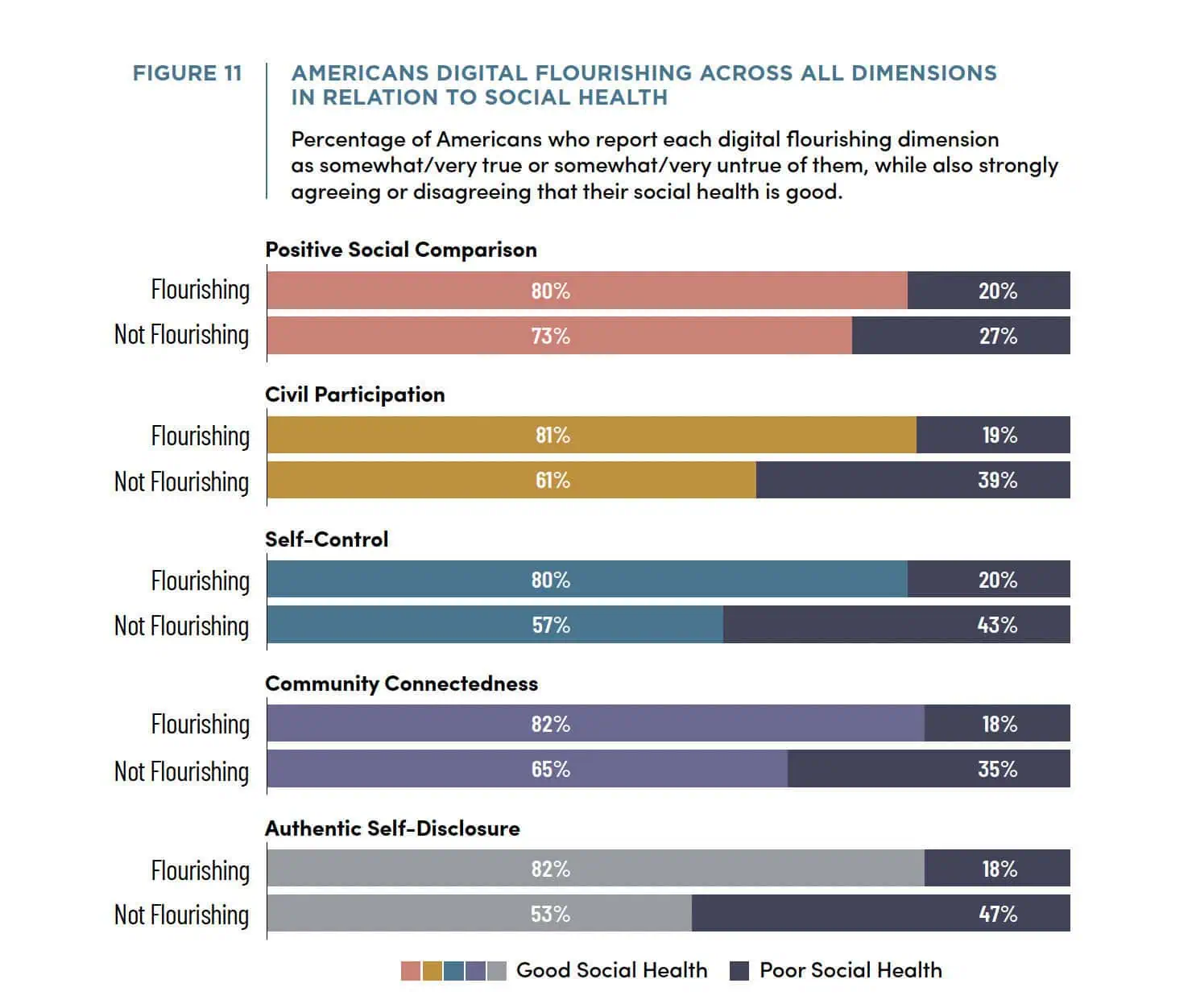
DIGITAL FLOURISHING AND SOCIAL HEALTH AMONG GEN Z
Social health is specifically important for Gen Z, who has reported the highest rates of loneliness among all generations. Similar to mental health, there is considerable public concern about social media’s negative impact on social health among young Americans (Gen Z), but what about the positive side of digital flourishing? First, similar to other surveys, we find that Gen Z is less likely than older generations to report good social health (Figure 12). However, as with the full survey sample, Gen Z adults are more likely to report good social health if they are digitally flourishing, with authentic self-disclosure and self-control being the dimensions with the largest differences (Figure 13). For example, whereas 30% of Gen Z who are flourishing in these dimensions report poor social health, this number increases to over 50% for those who are not flourishing on these dimensions.
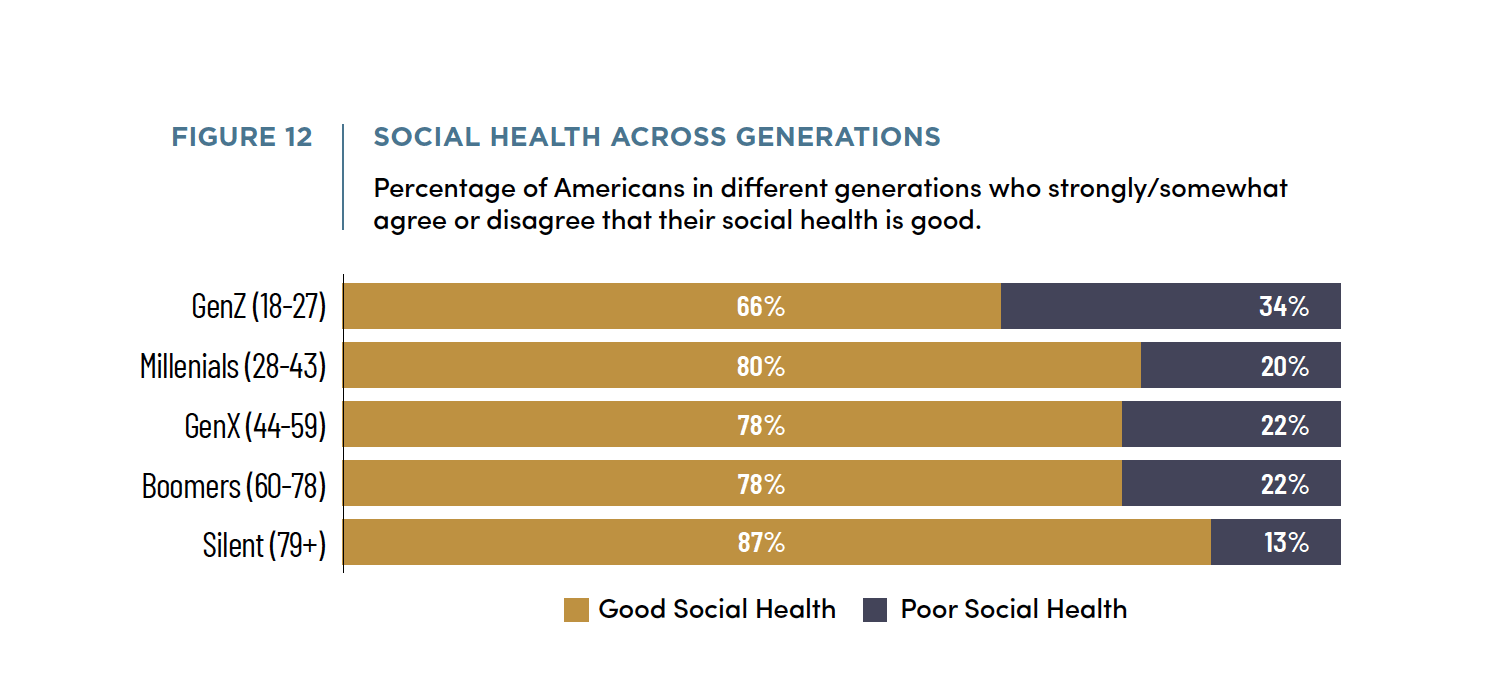
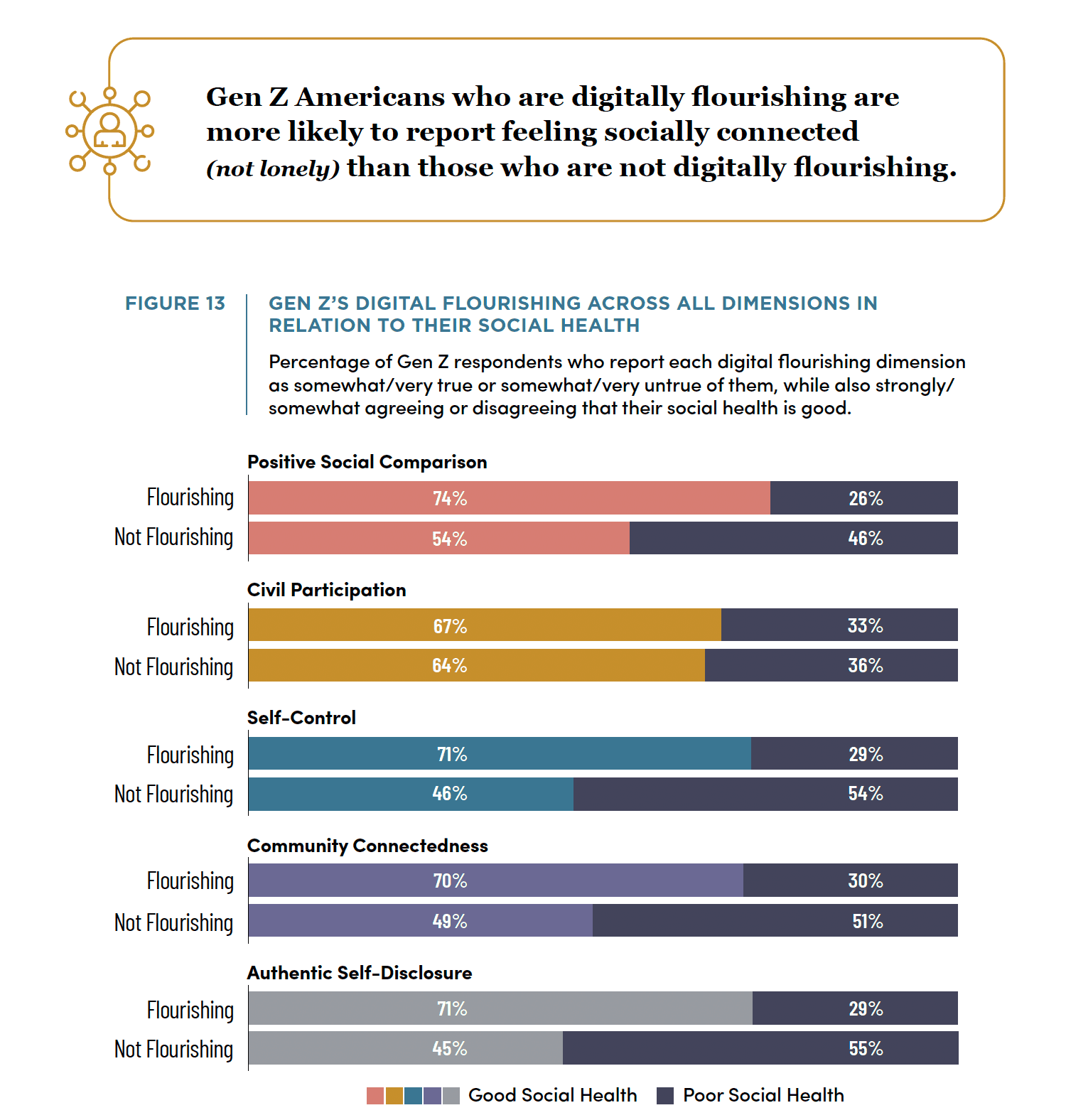
CONCLUSION
Public discourse about digital technology often fixates on its downsides—how social media and online interactions can undermine mental health, erode in-person relationships, increase polarization, and spread misinformation. While these and other concerns merit attention, this narrow focus overlooks how people actively use digital technology to fulfill important psychological needs, build meaningful connections, and pursue personal aspirations. To better understand these positive aspects of digital life, we conducted a national survey examining digital flourishing among Americans.
Most Americans demonstrate digital flourishing across multiple dimensions, with over three-quarters flourishing in at least three of the five dimensions measured. Americans generally feel comfortable presenting their authentic selves online, believe they can engage in civil discourse, feel in control over their online time, and feel connected to online communities. The only dimension where less than a majority of Americans flourish is in positive social comparison, though this varies significantly by demographic groups, with majorities of younger generations (Gen Z and Millennials) and racial minorities reporting that they are flourishing on this dimension.
Each dimension of digital flourishing shows distinct patterns across demographic lines. While White Americans report higher levels of authentic self-disclosure and self-control than other racial groups, Black Americans demonstrate the strongest sense of online community connection. Higher-income Americans generally report greater control over their online interactions, though interestingly, those with the highest incomes report the lowest levels of online community connection. These racial and income disparities warrant initiatives to close the digital divide in a community and societal level.
Generational differences are also notable, with older Americans generally showing more comfort with authentic self-disclosure and self-control, while younger generations excel in building online connections. While this survey cannot establish causation, it demonstrates a consistent positive association between digital flourishing and both mental and social health. These findings are particularly significant for Gen Z, who report higher levels of mental health challenges and loneliness compared to other generations. Since Gen Z spends considerable time in digital environments, promoting digital flourishing among this group may be especially critical for improving their overall psychological and social flourishing. This underscores the importance of creating online environments that promote digital flourishing for all Americans.
METHODOLOGY
This survey was conducted online within the United States by The Harris Poll on behalf of Archbridge Institute from September 26-30, 2024, among 2,076 adults ages 18 and older. The sampling precision of Harris online polls is measured by using a Bayesian credible interval. For this study, the sample data is accurate to within +/- 2.5 percentage points using a 95% confidence level.





